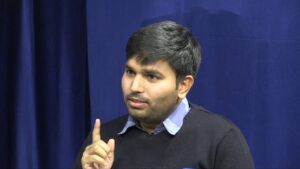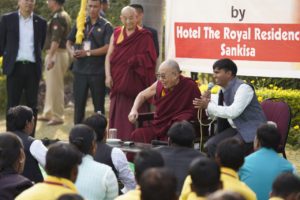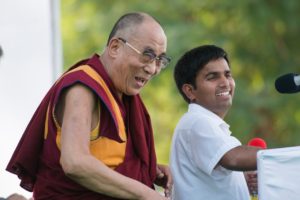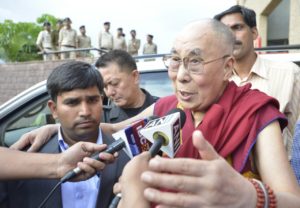 Kailash Chandra Bauddha, age 33, is the Hindi translator for His Holiness the Dalai Lama and lives in Mcleod Ganj. Not only does he have the privilege of working directly with His Holiness on a regular basis, he has also become an influential figure in his own right as a future scholar and a teacher of Tibetan Buddhism to the Indian population.
Kailash Chandra Bauddha, age 33, is the Hindi translator for His Holiness the Dalai Lama and lives in Mcleod Ganj. Not only does he have the privilege of working directly with His Holiness on a regular basis, he has also become an influential figure in his own right as a future scholar and a teacher of Tibetan Buddhism to the Indian population.
Kailash’s story traces from extremely humble beginnings to his now prestigious and important role. He was born in a very remote Indian town called Nagla Dhaukal in the Mainpuri District, Uttar Pradesh 100km from Agra. A village of about 150 people without electricity. He worked with his ten siblings as a farmer, raising cows, buffalo and many other livestock. Kailash recounts the limited resources in his village, making attending school very difficult. By sixth grade, his brother—a tour guide working in Agra and studying in Nalanda University, Bihar—offered Kailash the opportunity to study in Arunachal Pradesh, Shrawasti and he began to learn English, Pali, Singhal languages.
 When Kailash finished high school back in Manipur, he decided to enroll in university and work to become a dentist. He traveled to Lucknow—the capital of Uttar Pradesh—where he began studying for his BSc in Biology. However, throughout this, Kailash recalls a sense of personal emptiness about his future prospects in medicine.
When Kailash finished high school back in Manipur, he decided to enroll in university and work to become a dentist. He traveled to Lucknow—the capital of Uttar Pradesh—where he began studying for his BSc in Biology. However, throughout this, Kailash recalls a sense of personal emptiness about his future prospects in medicine.
It was at this time another opportunity was given by his brother. His brother—Suresh Chandra Bauddha—was head of the Youth Buddhist Society of India, which he founded in 1986 and which by that time had thousands of members. Kailash was already a Buddhist, as his family was of the Buddhist Shakya clan, and he felt a spiritual calling to develop upon these studies.
Despite being accepted to dental school, Kailash’s decision to drop out came in 2005. This occurred after he and his brother, along with members of the Youth Buddhist Society of India (YBS), travelled to the city of Dehradun to listen to Professor Samdhong Rinpoche, who at that time was Prime Minister of the Tibetan exile Government. Kailash was extremely impressed by Professor Rinpoche, who could speak fluent Hindi and Tibetan, and held titles of both monk and prime minister. Rinpoche advised him and other students to learn the dying languages of Sanskrit and Pali, as well as Tibetan, as a way to properly study the ancient Buddhist texts that are in danger of being forgotten. Kailash asked Professor Rinpoche for advice and Rinpoche suggested that since Hindi was his mother tongue and Sanskrit and Pali are closely related, that he should become a translator for scholarly works—a process that would take about ten years.
 And so, aged 19, Kailash moved to Library for Tibetan Works and Archives in Dharamshala (Mcleod Ganj). He was introduced to the Tibetan style of group debate, and this inspired him to learn Tibetan so he could participate in such activities. He enrolled in the College of Higher Tibetan Studies, Sarah. What followed was a new, dynamic academic career. He studied Tibetan language for three years, and then Buddhist classical studies, Buddhist psychology, the Sutra of Wisdom and Perfection and the Middle Path Philosophy among other subjects.
And so, aged 19, Kailash moved to Library for Tibetan Works and Archives in Dharamshala (Mcleod Ganj). He was introduced to the Tibetan style of group debate, and this inspired him to learn Tibetan so he could participate in such activities. He enrolled in the College of Higher Tibetan Studies, Sarah. What followed was a new, dynamic academic career. He studied Tibetan language for three years, and then Buddhist classical studies, Buddhist psychology, the Sutra of Wisdom and Perfection and the Middle Path Philosophy among other subjects.
The next opportunity came in the midst of his studies. He was assigned to accompany a group of visiting Buddhist PhD scholars into Rajasthan, Uttar Pradesh and Maharastra to assist with their limited Hindi language skills. He found he was able to translate from Tibetan to Hindi and vice versa, that he liked the work, and decided to keep doing it while studying for his 16 year long PhD.
In 2012, by which time he had developed a reputation as a translator, Kailash was told that His Holiness was in need of a Hindi translator and was offered the job. Kailash was surprised and hesitated at first as the duty and privilege felt overwhelming and he was concerned that it would be very difficult to translate for His Holiness because his wisdom is vast and deep. However, His Holiness’s secretary provided no other options—telling Kailash he must do it and it was his duty. What ensued was a simultaneous translation during a five hour teaching in a day by His Holiness. Despite the great difficulty of the job, the observing Indian officers, audiences acknowledged that he was doing good work translating the teaching into clear, simple Hindi.
What ensued was Kailash’s new role as His Holiness’s Hindi translator. In addition to a personal friendship with His Holiness, he accompanied him on his teachings to massive audiences across India, including organising trips in 2015 and 2018 for His Holiness to visit his own hometown, Sankisa, Uttar Pradesh,India, drawing in thousands of people. He was also the translator for His Holiness’s book An Appeal to the World in Hindi.
 Throughout this, Kailash’s role of leadership in the Indian Buddhist community expanded further. Kailash himself has taught the Buddhist principles of compassion and kindness to large crowds of people. When asked about his largest audience, Kailash nonchalantly responds, “About a hundred thousand.” When asked if speaking to such huge crowds draws anxiety, he appears unphased and points out that it’s just something that can be done naturally.
Throughout this, Kailash’s role of leadership in the Indian Buddhist community expanded further. Kailash himself has taught the Buddhist principles of compassion and kindness to large crowds of people. When asked about his largest audience, Kailash nonchalantly responds, “About a hundred thousand.” When asked if speaking to such huge crowds draws anxiety, he appears unphased and points out that it’s just something that can be done naturally.
Today, Kailash continues studying for his PhD in the Institute of Buddhist Dialectics (IBD), Mcleod Ganj, which he will complete in another five to six years. In Kailash’s words, his life is fully dedicated to the revival of Buddhism in India, and on a wider scale a reform of education systems around the world that, in his view, are sorely missing principles like compassion that should be taught to students in addition to material knowledge. This follows the advice of His Holiness always says.
Kailash says he is very much impressed by the Tibetan language and Tibetan scholars who inspire him to study the Nalanda Tradition of Buddhism. He is grateful that he has found learning Tibetan a very friendly process.




 Print
Print Email
Email













